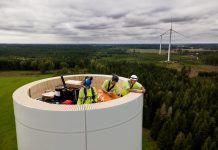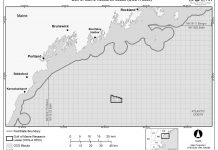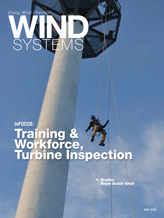Creating an educated workforce skilled to meet the demands of a changing economy is the focus at Kalamazoo Valley Community College’s Groves Campus. Originally opened in 2001 as one of 18 M-TEC facilities across the state, the Groves Center was financed by a $5 million grant from the Michigan Economic Development Corporation, plus $6 million in matching funds provided by area companies and foundations. It offers a variety of training programs for those looking to embark on a new career path, including fast-track training academies that are designed with input from local employers.

One of its most notable programs is the Wind Turbine Technician Academy (WTTA), which was launched in 2009 and has quickly earned a reputation as one of the premier training sources for wind-industry professionals.
The Wind Turbine Technician Academy provides an opportunity for individuals to learn, develop, and master skills that are highly sought after in the wind-energy industry.
The WTTA is a competency-based, 24-week training program designed to teach individuals the skills necessary to work as wind-turbine technicians. Upon successful completion of the program, students typically enjoy a high placement rate within the wind-energy industry.
The program meets Monday through Friday from 8 a.m. to 4:30 p.m. During scheduled service trips, students can expect to work 10 to 12 hours a day to complete the scheduled tasks.
The college has educational affiliations with two Michigan-based utility companies that give the WTTA sole responsibility for five utility-grade turbines in the state. Students can expect to spend at least two weeks working in the field on these turbines.
Combining knowledge and application
The field service trips are a unique way for WTTA’s trainees to combine the theoretical knowledge and laboratory application on turbines that are producing electricity to the grid. Graduates receive real-world experience well before they are hired by an employer in the wind industry.

Kalamazoo Valley’s WTTA differs from similar programs in the U.S. in that it is competency-based rather than credit-based. Each competency has been validated by the industry as a necessary skill for wind-turbine technicians. Students must demonstrate with 100 percent proficiency that they can complete the tasks. These competencies are proven by hands-on demonstrations completed in the presence of one of the instructors or representatives from industry who may be visiting.
As students are completing the competency demonstration, they will need to describe what they are doing as well as answer questions from the person evaluating them. This provides opportunity for students to learn the theory and reasoning for the tasks they are performing. Instructors work closely with each student to develop and strengthen troubleshooting skills. There is not always one solution to each problem encountered in the industry, so instructors try to guide students to discover the most preferred solutions.
Learning the skills necessary to be successful as a wind-turbine technician requires hours of hands-on practice. So, as a general rule, the college aims to keep the class time to a minimum, spending about 85 percent of their time in the laboratory or in the field.
Training series
Additionally, students enrolled in the academy must complete ENSA GWO BST training series, which includes working at heights, first aid, fire prevention, and manual handling. All work at heights training is completed on the college’s 100-foot climbing tower or on the indoor climbing structure.

In order for this type of training to be successful, class sizes must remain small. The college only accepts a maximum of 12 students each session, allowing it to maintain an ideal student-to-instructor ratio. Acceptance into the academy is based on a detailed application process.
“Individuals are required to apply for the academy with an application similar to a job application. They need to provide contact references, pass a mathematics test, as well as conduct an interview. This application process allows the WTTA team to identify individuals with the most potential for success.
Graduates of the WTTA typically take positions as wind-turbine technicians either on a wind farm or as a traveling technician for virtually every major OEM and service and maintenance provider in the U.S. wind industry. New wind-energy projects are being constructed throughout the U.S., and they will require technicians to maintain and service wind turbines. The demand for highly trained wind-turbine technicians will continue to rise as more projects are constructed.
Career opportunities
The WTTA team is constantly being notified of career opportunities in the wind industry. The school maintains a private network in order to inform previous graduates of available opportunities.
In order to meet goals put in place by the U.S. Department of Energy, the wind-energy industry will need to continue growing.
Currently trending in the U.S. wind industry is more corporate ownership of wind assets every year as it allows a corporation to identify its actual energy costs for many years — sometimes up to 20 years. With the increased demand from private industry, wind energy will continue to grow. The growth in wind energy is coupled with a steady increase in employment for people to support the increased wind capacity.
At the same time, technology is ever changing, and turbines are becoming more efficient and sophisticated every year. This requires a workforce with diverse skill sets in order to maintain and repair legacy machines as well as the newer and more advanced machines. WTTA’s close working relationships and validation from the industry, coupled with its competency-based program, allows the college to continuously improve to make certain its graduates receive the knowledge and skills needed to satisfy all of the requirements of the industry.

Certifications
Kalamazoo Valley’s WTTA has earned both the American Wind Energy Association (AWEA) seal of approval and certification by the Bildungszentrum für Erneuerbare Energien (BZEE) Renewable Energy Education Center. Upon successful completion of a series of written and practical tests, as well as a completion of the field service, students receive certification as a service technician for wind-turbine engineering through the BZEE.
Companies in the wind industry have become familiar with WTTA’s program. Employers benefit from hiring its graduates because they are not only hiring an employee who is fully certified and competent, but they also have gained experience on real components and actual field experience all within the 24-week training period.
Kalamazoo Valley runs two academies per year; one typically starts during the first week of January, and the other normally starts the first week in July.
Established in 1966, Kalamazoo Valley Community College is a comprehensive, fully accredited, public, two-year college with about 10,000 students. Kalamazoo Valley offers certificate programs in more than 20 areas of study and associate degrees in 25 others. In addition to associate degree and certificate programs in business, health care, human and public service, technical occupations, and industry, the college also provides a quality experience for students preparing to transfer to four-year institutions following graduation.
To learn more about the WTTA, contact Delia Baker at dbaker2@kvcc.edu or (269) 353-1554.


































